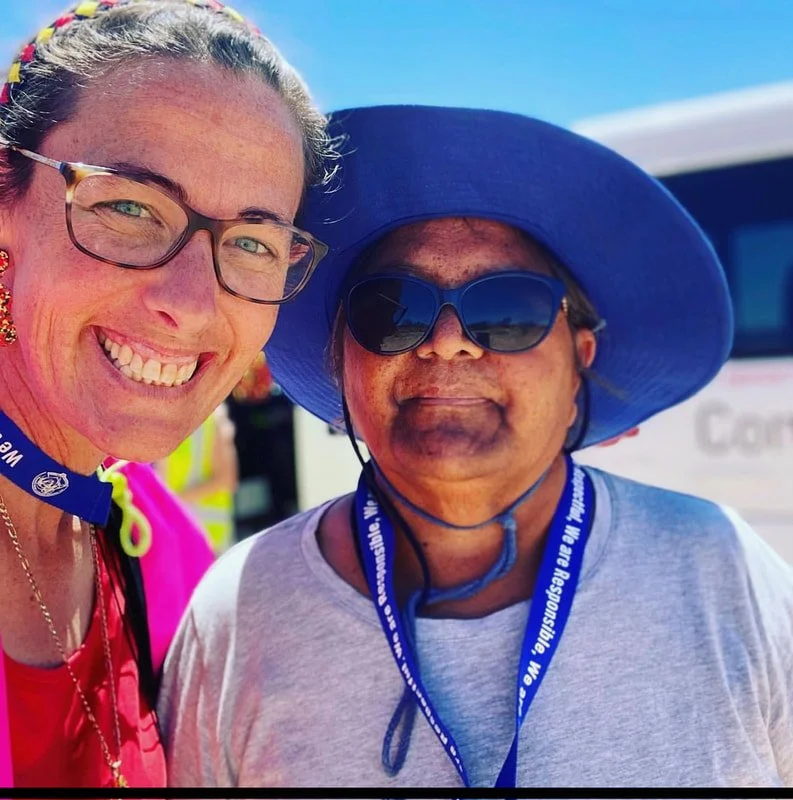Appreciating School Elders
As a graduate, nearly 20 years ago, I arrived in a small mining and pastoral town for my first posting. I was fresh off my fourth-year units at university - including our “Aboriginal Education” unit - where we were told: “Aboriginal children outside of the city will communicate like this, don’t do this, don’t ask that…”.
Being very aware of what “not to do”, I arrived at my new school, was introduced to a whole heap of people and shown my classroom. As I walked out the door I heard a voice “You be right miss, just sing out for Nanna”.
So many questions went through my head. What did they mean “you be right” and how would singing a song help me? I didn’t know anyone in this town. How in the world would I have a Nanna here?
That afternoon, it all became clear. The Nanna everyone kept referring to was our AIEO, Nanna Phyllis. I knew I needed to introduce myself so I found her with a cup of Bushells tea in the staff room. “Hi my name’s Kristine. I’m new here”. “Hello, you can call me Nanna”.
From then, I knew this woman would be my saviour, my guide to all things I needed to know and some things I didn’t realise I needed to know.
She sat me down and told it to me straight. What I had learnt in that university unit was good for some communities but mob isn’t the same all over. I listened, she yarned. I asked questions, she gave me answers. I learnt when it was time to be quiet and when it was okay to speak up.
Over the years, Nanna would tell me that there are times she doesn’t understand all the flash talk and she asked for my help. This is when I knew that we had become more than colleagues, more than that - she became my Nanna too!
It wasn’t long before I was headed further east to a remote community. I was sad to be leaving my safety net but excited for what was to come. Arriving at my school, I knew my priorities. Not finding my classroom or the staffroom or where to park my car but finding the glue of the school. I went looking for a Nanna. I didn’t find one! I went expecting to find an AIEO, an Elder, someone to show me the way. But to my surprise, the person showing me the way wasn’t much older than my own mother.
“This is Uncle”. It was then I realised that being an Elder wasn’t about age but about guidance, culture, sharing language, art, traditions.
My time at this school was short lived. Department red tape saw me take a position 22 km from town. Upon arrival, I was met by the principal and her husband. I was one of two teachers and on my first day - being assigned to a class without time to build up relationships - I was spoken to in a language I didn’t know. I hadn’t even stepped foot into a classroom yet!
I wasn’t sure what was being said, but my gut feeling was that it wasn’t nice. I went to the common kitchen where I found an elderly lady and another - they looked like sisters. They were there making breakfast for the kids. “Hi, I’m Kristine, I’m so sorry if what I am going to say is rude, or I say it wrong, but what does ********** mean?”. “Balay, Miss you need to chip them for that!”
Thinking back to the phrase “sing out for” on my first day, I knew not to take this in a literal sense but question myself what this meant. So after a deep breath, as I started to walk away I felt this presence behind me. I walked into the classroom and the younger of the two ladies was right there beside me. It was here I learnt the meaning of “chipping” someone and I also learnt her name - Nanna Valda.
She didn’t know me but she backed me, she stood up for me, she showed strength and courage.
From then, we were a team. She taught me culture, language and traditions. She took me to the special spots around the community and she guided me through some exceptionally difficult yet rewarding years.
Many years passed and I ended up back at my original school, and guess what? Nanna Phyllis was still there! Age had definitely caught up with her, she was a little slower to move from point to point but goodness me, the yarns, the guidance, the friendship, was still there. When I had my son, Nanna took him from my arms “Hello my Pop”. This is what making true connections with your community can be like, making connections with our Elders. My son questioned me a while back, “why we call her Nanna?” and before I could answer he said “because she’s the family we choose, for respect?” I think that’s a pretty good answer.
So this NAIDOC Week - For Our Elders - I am thankful to the Elders past and present who I’ve made connections with, for the emerging Elders I’m currently working with and excited to witness the future Elders - listening and learning!
Kristine Davis is a wife, mother, volunteer ambulance officer, educator & ally, teaching and raising a family on Badimia country. You can follow her on instagram @theworldofmrsdavis


